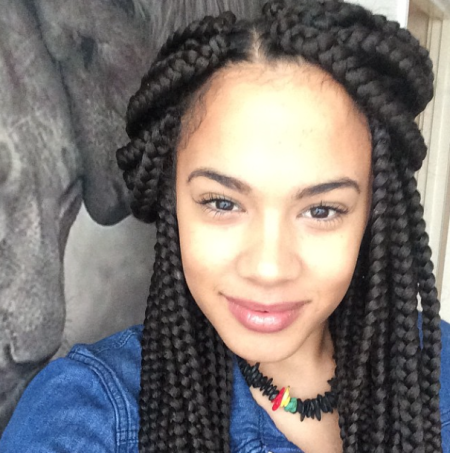With several anti-discrimination laws, and some MPs even claiming that these laws are no longer needed in our so called ‘post-racial’ society, one might think that something as seemingly innocuous as one’s natural hair, should not prevent one from getting a job.

This, unfortunately, was not the case for natural hair blogger and model, Simone Powderly, who recently revealed that she did not get a job because of her braids.
“I went for an interview at Elite Associates – a beauty agency that works with various “high end” brands,” Simone wrote on her blog simonepowderly.com. “It was a group assessment with women from all different ethnic backgrounds in the room. The interview procedure was to stand up, speak about yourself and sell a brand.”
Simone did well in the group stages showcasing her knowledge of the beauty industry and the Afro-Caribbean market. She soon received a phone call from the recruitment company who told her she had gotten to the next stage but asked her to take out her braids as the company wanted a more ‘natural’ look.
“I have never been asked such a thing in my life, and to be honest, it hurt,” the blogger added. “Apparently it seemed my box braids weren’t acceptable for luxury brands like Dior and Chanel? I’m sure Beyoncé has rocked her box braids and not been turned away? When Kylie Jenner rocked her braids would they turn her away from coming to their stand? NO!”
She struggled with the decision of whether or not to take her braids down, and even emailed the company about the issue.
“I couldn’t decide what to do,” she said in an interview with The Voice Newspaper. “If I took them out then I wasn’t standing up for equal rights and basically saying it’s OK to discriminate against me.”
When she didn’t hear back from them, she decided not to attend the interview, and instead continued to pursue the issue with the recruiter.
This is not the first time a young woman of colour has been discriminated against because of her choice of hairstyle.
Just last month Disney actress Zendaya Coleman, was mocked by fashion police commentator Giuliana Rancic, for wearing dreadlocks to the Oscars and was told she looked like ‘she smelt of weed’.
Last year natural women within the US army protested against their updated regulations which banned them from wearing their hair in twists and large cornrows, a go-to style for many natural women.
It seems that, despite India Arie’s well-intentioned proclamation, many black women are being defined by their choice of hairstyle and are being told that their hair somehow stops them from doing their jobs properly.
In the days of slavery, black women, and their often tightly coiled hair, were seen as inferior to white women, and therefore undesirable.
Since then, we’ve tried our hardest to alter the texture of hair, from using chemical straighteners to spending thousands of pounds on hair extensions, in order to get that European look and perhaps be more accepted in a society where a warped view on physical appearances, is the norm.
In the last decade or so, more and more women of colour are embracing their natural hair textures, and even some big name celebrities have been seen rocking ‘fros or braids.
While the narrative around natural hair and racial discrimination is slowly changing, cases like Simone’s suggest that there is still a long way to go and that racial discrimination and prejudice is still embedded in the very fibres of our society.
Perhaps someday this will change, and women, whatever their race will have the freedom to wear their hair however they like- whether that’s natural or relaxed, with weave on in braids- without feeling discriminated against.










